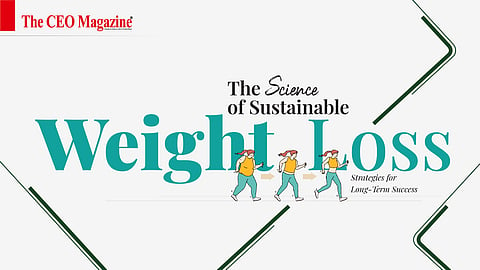
- News
- Women
- Magazine
- IndustryIndustry
- InsightsInsights
- Success Stories
- PublishPublish
- ContactContact
- Media KitMedia Kit

The Science of Sustainable Weight Loss Strategies for Long-Term Success
In a world inundated with fad diets and quick-fix solutions, achieving sustainable weight loss can often feel like an elusive goal. However, the path to a healthier weight doesn’t have to be a constant cycle of deprivation and frustration. By understanding the science behind sustainable weight loss and implementing evidence-based strategies, individuals can embark on a journey towards long-term success and improved well-being.
At its core, sustainable weight loss is about creating a calorie deficit, where the calories consumed are fewer than the calories expended. While this may sound simple in theory, numerous factors influence our ability to achieve and maintain this balance. Metabolism, hormonal regulation, and genetic predispositions all play crucial roles in determining our body weight and composition.
Strategies for Sustainable Weight Loss
To achieve lasting success in weight loss, adopting sustainable strategies is key. Here are eight strategies that can help you not just lose weight but sustain it in the long run.
Setting realistic goals is paramount for sustainable weight loss. Instead of fixating on drastic changes, aim for gradual progress. Start by assessing your current habits and setting achievable milestones. For example, aim to lose 1-2 pounds per week rather than setting unrealistic expectations.
Nutrition forms the foundation of sustainable weight loss. Focus on incorporating whole, nutrient-dense foods into your diet, such as fruits, vegetables, lean proteins, and whole grains. These foods are not only rich in essential nutrients but also tend to be lower in calories, helping you feel fuller for longer periods.
Portion control is key to managing calorie intake. Use visual cues or portion-control tools to help you gauge appropriate serving sizes. Additionally, pay attention to your body’s hunger and fullness cues to prevent overeating. Eating slowly and mindfully can also help you enjoy your meals more and avoid mindless snacking.
Stay Active
Regular physical activity is essential for both weight loss and overall health. Aim for at least 150 minutes of moderate-intensity exercise per week, such as brisk walking, cycling, or swimming. Find activities you enjoy and make them a regular part of your routine to increase calorie expenditure and improve fitness levels.
Incorporating strength training into your fitness routine can help preserve lean muscle mass during weight loss. Muscle tissue burns more calories at rest than fat tissue, contributing to a higher resting metabolic rate. Aim to include resistance exercises, such as weightlifting or bodyweight exercises, 2-3 times per week to build and maintain muscle mass.
Practice Mindful Eating
Mindful eating involves paying attention to the sensory experience of eating and being present in the moment. Slow down and savour each bite, focusing on the taste, texture, and aroma of your food. By tuning into your body’s hunger and fullness cues, you can prevent overeating and develop a healthier relationship with food.
Get Adequate Sleep
Sleep plays a crucial role in regulating appetite hormones and metabolism. Aim for 7-9 hours of quality sleep per night to support your weight loss efforts. Prioritise sleep hygiene practices, such as maintaining a consistent sleep schedule, creating a relaxing bedtime routine, and optimising your sleep environment.
Manage Stress
Chronic stress can lead to emotional eating and hinder weight loss progress. Incorporate stress-reduction techniques into your daily routine, such as meditation, yoga, or deep breathing exercises. Prioritise self-care activities that promote relaxation and well-being, helping you cope with stress more effectively.
Achieving sustainable weight loss requires a multifaceted approach that addresses dietary, physical, and emotional factors.
By implementing evidence-based strategies such as setting realistic goals, prioritising nutrition, staying active, and practising mindfulness, individuals can embark on a journey towards long-term success and improved health. Remember, sustainable weight loss is not just about reaching a number on the scale but about fostering a balanced and healthy lifestyle that supports your overall well-being.
With dedication, patience, and perseverance, anyone can achieve their weight loss goals and enjoy a happier, healthier life.
Follow us on Google News
